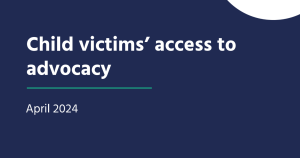Thousands of child victims of domestic or sexual abuse are being forced to navigate complicated and often traumatic criminal justice processes alone, without being offered specialist support.
New figures from the Children’s Commissioner for England show that the vast majority (92%)[1] of cases involving child victims of sexual violence or domestic abuse are receiving no direct advocacy support – that’s equivalent to 218,000 incidents over one year.
In each of these cases, recorded in the 2022-23 financial year, no referral is recorded by police forces to any advocacy service, despite multiple examples of child specific roles already established, leaving these children to fend for themselves in often complex and bewildering legal proceedings.
The government’s Victims and Prisoners Bill – which begins Report Stage today – is a timely opportunity to ensure children can consistently access this vital support.
Commissioner for England Dame Rachel de Souza said:
“In The Big Ambition, only one in five children said they feel listened to by adults in power – their voices and experiences are being ignored in a world designed by and for adults.
“Child victims of the most serious crimes, unlike other groups of children with specific vulnerabilities, are not automatically entitled to an advocate: a specially trained person to support them through difficult circumstances and make sure their voice is heard. This has to change.
“These children are traumatised, then often thrust into a re-traumatising criminal justice process with very little understanding of what it will involve, and very little support.
“Children’s advocates must have the necessary training and qualifications to work with vulnerable children, including how to work in an age-appropriate way. Their services should be offered automatically and by law, to ensure children can access safety and justice.”
The Children’s Commissioner used her legislative powers to request data from all 44 police forces in England and Wales, including the British Transport Police. The full data publication will be published in the coming months. Today’s snapshot shows that most police forces do not collect data on whether children are referred onto advocacy support services, and in those that do, the vast majority of cases receive nothing.
Findings include:
- The vast majority of child victims of sexual abuse (92% of cases)[2] receive no support. Of 102,000 recorded incidents involving child victims, there is no record of a referral to advocacy services.
- For these victims, the average referral rate across the 11 responding forces was just 8%, ranging from 1% to 24%.
- The vast majority of child victims of domestic abuse (92% of cases)[3] receive no support. Of 116,000 recorded incidents involving child victims, there is no record of a referral to advocacy services.
- For these victims, the average referral rate across the 4 responding forces was just 8%, ranging from 1% to 15%.
- Across all forces, this is equivalent to:
- an estimated 109,000 incidents involving child victims of domestic abuse without specialist advocacy support referrals; and
- an estimated 7,000 incidents involving teenage victims who had experienced abuse in their own intimate relationships without specialist advocacy support referrals.
Over the past year, the Children’s Commissioner’s office has been working with child victims to understand what they need to recover and to access justice. For those who had access to advocacy services via trained advisors, the support offered to them was transformative:
“It was a therapeutic relationship…more beneficial than the therapy I had. I remember talking with her when I was really down, because I was almost grieving for myself – I really felt like I had lost who I was… I would have never thought I’d be like where I am now.” – Girl, 15, victim of peer-on-peer sexual assault (interviewed March 2023)
The Children’s Commissioner is calling for children’s statutory entitlement to independent advocacy to be expanded to include when they are victims of the most serious crimes. To further strengthen the bill, in addition to increasing children’s access to advocacy, she would like to see:
- A statutory definition of child criminal exploitation;
- More agency for children engaging with the criminal justice system, including around Victim Information Requests and the Independent Public Advocate role;
- A Victims Code of Practice for children, with strengthened accountability measures; and
- A national network of Child Houses which provide joined up care to child victims of the most serious crimes.
[1] This figure is likely an underestimate of how many children do not receive any support, as it is based on the referral rate in forces that reported making any referrals to advocacy services.
[2] This figure is likely an underestimate of how many children do not receive any support, as it is based on the referral rate in forces that reported making any referrals to advocacy services.
[3] As above.





